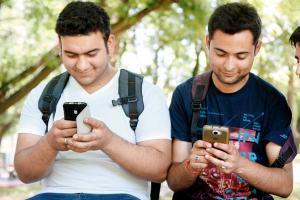What we post on social media platforms says as much about us as it does about the people who have access to this information

A study published in the UK this week concluded that Instagram, Snapchat, Facebook, Twitter and YouTube are the most damaging social apps. Pic for representation
 I deleted my Facebook and Instagram accounts at the start of 2018. I thought this would be painful, given my inexplicable need to check updates on both platforms whenever I wasn't doing anything important. I expected withdrawal symptoms, too, because I had spent so much time on them, and was used to knowing exactly where my family and friends were and what they were up to.
I deleted my Facebook and Instagram accounts at the start of 2018. I thought this would be painful, given my inexplicable need to check updates on both platforms whenever I wasn't doing anything important. I expected withdrawal symptoms, too, because I had spent so much time on them, and was used to knowing exactly where my family and friends were and what they were up to.
The funny thing is, nothing happened. I deleted the apps, and promptly forgot about them. It's been almost a year now, and I haven't been tempted to reinstall either of them, create a new account, reach out to people I know, or wonder about which exotic destination they are holidaying in. In other words, I have gone back to living like a normal human being, back when we didn't have smartphones and could focus on our own lives instead of being obsessed with everyone else's.
ADVERTISEMENT
There was an interesting study published in the UK this week, by the Royal Society for Public Health. It evaluated the negative impact of some of the most popular social apps of our time, and came to the conclusion that Instagram, Snapchat, Facebook, Twitter and YouTube were the most damaging, in descending order. Another study published in the Journal of Social and Clinical Psychology pointed out why limiting Facebook and Instagram to 10 minutes a day could be beneficial.
What makes these results interesting is how they fly in the face of what we were given to believe not so long ago, that social media is about helping us connect with others. A majority of us continue to believe that it allows us to stay in touch, fights loneliness, and can even help people deal with depression, while more and more research is starting to suggest that the opposite is closer to the truth. Researchers from the University of Pennsylvania have established a clear causal link between decreasing social media use, and improvements in loneliness and depression.
I had a number of reasons for dropping out. There was annoyance, for a start, prompted by people I know insisting on checking in and out of places just to try and convince others on their networks that they were living a more interesting life than everyone else. There was the constant stream of photographs involving babies, cats, babies with cats, and other things that really had no impact on me whatsoever. Then there was the politics, a relentless torrent of information, quotes, videos and opinions on what our politicians had said about a particular group, prompting endless discussions about issues we ought to have put behind us a century ago.
Eventually though, I just grew tired of sharing aspects of my life with everyone else. I wanted to live in private for a change, to enjoy a sunset without feeling the need to click a photograph of it for posterity. I realised I wasn't particularly interested in what my family and friends were doing, because I could always ask them about their lives in person whenever I met them. The Fear Of Missing Out that is increasingly used with devastating effect by marketing professionals stopped bothering me too, because I realised I didn't need to have an opinion on the seventh episode of the fifth season of a particular TV show.
I also took a long, hard look at what I was posting on Twitter and arrived at the worrying conclusion that I was engaged more in the countering or propagation of information related to hate than I was about more positive things. I was choosing to engage in conversations about bigotry only to counter those opinions, and inadvertently allowing those hateful messages to spread by simply reacting to them. Politicians were unleashing armies of trolls to lie about India and Indians, and I was helping them in my own way by choosing to try and shout them down.
What happens in 2019 is anyone's guess, as far as the state of our country is concerned. We may move towards a more hateful place, which is difficult to imagine considering how much we seem to have seen over the past couple of years. I have decided to stay away from that conversation though, even if it means withdrawing from what will affect my life as well as the lives of millions like me. I have decided to talk about art and music and literature instead, if only to drag a bit of light into what is an ever-encroaching area of darkness.
When he isn't ranting about all things Mumbai, Lindsay Pereira can be almost sweet. He tweets @lindsaypereira Send your feedback to mailbag@mid-day.com
Catch up on all the latest Mumbai news, crime news, current affairs, and also a complete guide on Mumbai from food to things to do and events across the city here. Also download the new mid-day Android and iOS apps to get latest updates
 Subscribe today by clicking the link and stay updated with the latest news!" Click here!
Subscribe today by clicking the link and stay updated with the latest news!" Click here!







